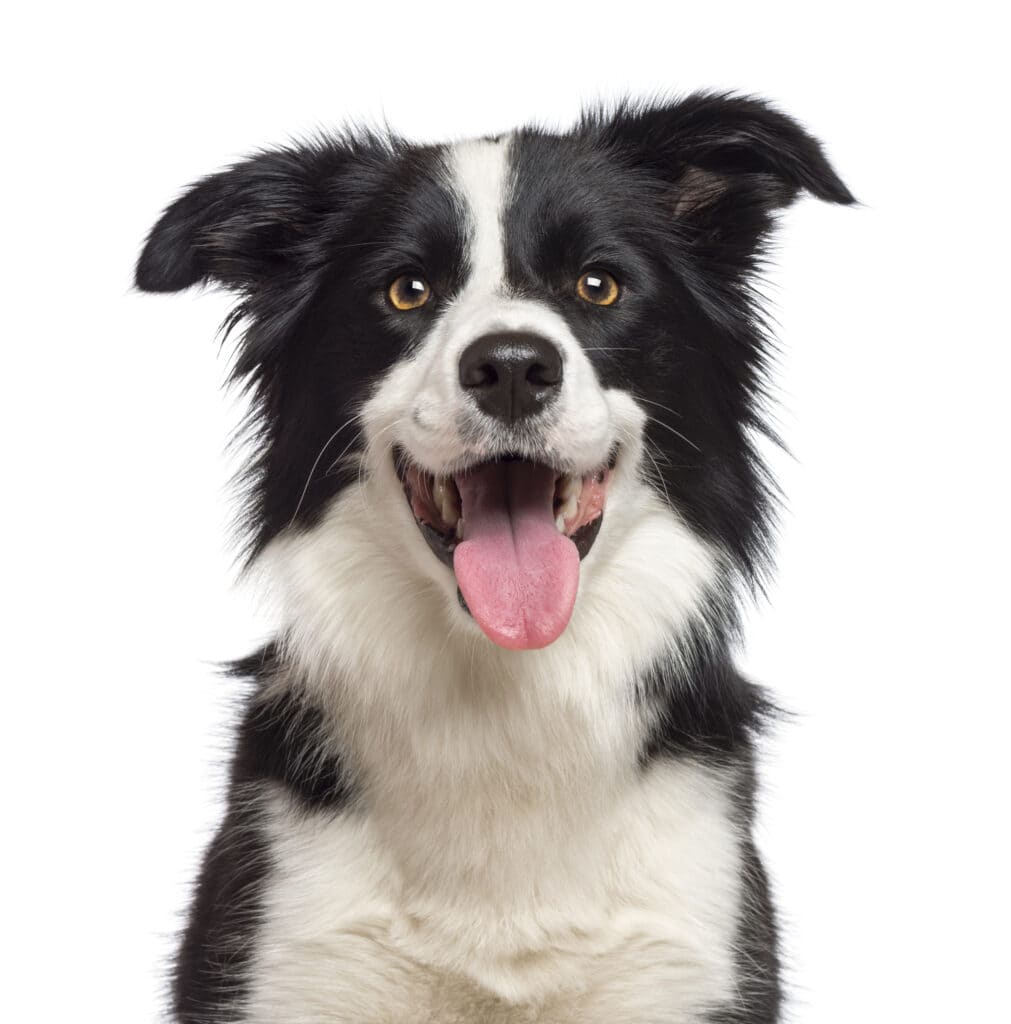Our website is supported by our users. We sometimes earn money when you click an affiliate link and make a purchase. This is at no extra cost to you and helps us to create quality content. For all that have shown us such wonderful support, we thank you from the bottom of our hearts!
The Border Collie dog breed is renowned for its intelligence, agility, and tireless work ethic.
Originating from the hilly border country between Scotland and England, they have been developed into one of the premier herding dogs, capable of managing flocks with minimal instruction.
Their history is rooted in the vast, open fields where their primary role has been to assist shepherds in controlling sheep.
This breed exhibits a high level of energy and requires ample mental and physical exercise to remain balanced and content.

A medium-sized dog with a coat that can vary in length and color, the Border Collie is designed for endurance.
Their expressive eyes are a hallmark of the breed, often showing an intense ‘herding stare’ which they use to control other animals.
An optimal combination of speed, agility, and intelligence makes them the ideal competitor in canine sports, especially herding trials, agility, and obedience.
When it comes to training and temperament, their keen intelligence makes them highly trainable but also means they can get bored easily, hence consistent engagement is essential for their well-being.
Key Takeaways
- These dogs are highly intelligent and skilled herding dogs with a rich history.
- They have distinctive physical characteristics and require regular mental and physical stimulation.
- Proper training, grooming, and awareness of their health needs are crucial for a Border Collie’s well-being.
History of the Border Collie
When you trace the lineage of the Border Collie, you’ll find its roots deeply embedded in the rural landscapes of the British Isles, particularly having Scottish Heritage.
They are renowned for their intelligence and herding abilities, these dogs have been indispensable companions to shepherds. The breed’s name itself—Border Collie—reflects its origins along the Anglo-Scottish border.
The breed’s history is not a recent one.
Their ancestors were pivotal in managing sheep flocks in the rugged terrain of Scotland and other regions.
Over time, selective breeding honed their herding skills, leading to the agile and perceptive sheepdogs you recognize today.
- Sheepdog Trials: These events showcased the breed’s herding prowess, and the Border Collie dominated with ease. Their capabilities in these trials further cemented their status as top herding dogs.
- Scotch Collie: An early ancestor, the Scotch Collie was known for its work ethic and herding talent.
During the 19th century, Queen Victoria encountered the breed and was reportedly captivated by their charms and skills.
This royal encounter helped raise the breed’s profile far beyond the British Isles, extending to countries like New Zealand and Australia, where their herding talents were in high demand.
By the 20th century, the Kennel Club (UK) began recognizing the breed officially.
This move not only provided a standard but also a platform for the breed’s enthusiasts to share and preserve the Border Collie’s remarkable herding legacy.
Today, when you think about a herding dog, the Border Collie is likely the first that comes to mind, exemplifying a rich heritage of dutiful shepherding across generations.
The Border Collie Society of America is very active in the United States.
Physical Characteristics of the Border Collie
The Border Collie is a medium-sized dog with a build that signifies an athletic, alert, and energetic nature. Their expressive eyes and diverse coat colors contribute to their striking appearance.
Height Male
Males stand between 18 to 22 inches at the shoulder.
Height Female
Females are slightly shorter, typically ranging from 18 to 21 inches at the shoulder.
Weight Male
Males weigh between 30 to 45 pounds.
Weight Female
Females generally weigh a bit less, around 27 to 42 pounds.
Eye Colors
Your Border dog’s eyes can be a range of colors, including brown, blue, or even one of each in the case of merle breeds.
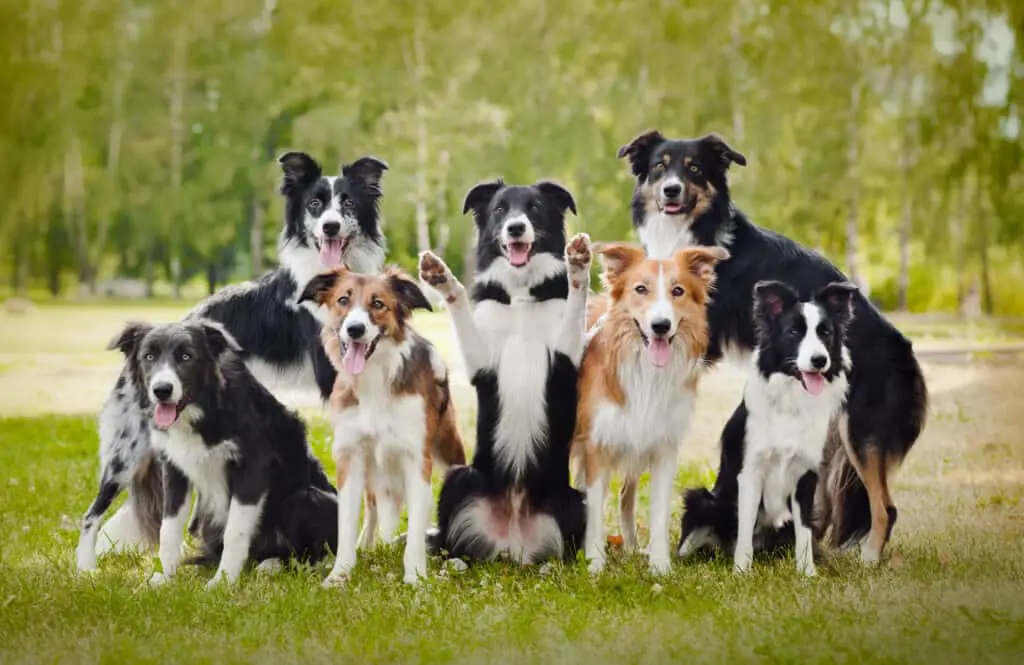
Coat Colors
The breed has a variety of coat colors such as black, various shades of merle (including blue merle, red merle), gold, sable, tricolor, bicolor, solid color, lilac, blue, and brindle.
Coat Types
Border Collies have a dense double coat that can be rough or smooth, providing them with protection from the elements and varying degrees of shedding.
Body Type
Their body type is muscular and nimble, refined for both speed and agility which makes them exceptionally suited for herding and other active jobs.
Life Expectancy
You can expect your dog to be your companion for around 12 to 15 years.
Overview of the Physical Characteristics of the Border Collie
For prospective Border Collie owners, understanding that this breed is medium in size, highly athletic, and possesses an alert and friendly expression comes in handy.
The coat may be a rancher’s concern with its rough or smooth variations, but it’s the eagerness and friendly nature paired with the dog’s physical traits that make them a popular choice for an active household.
Temperament & Training of the Border Collie
As mentioned, they are an intelligent breed with an intense drive, traits that make them as much a joy to train as they are a commitment.
As a working breed, their energy levels are among the highest of dog breeds, therefore it’s crucial for you to provide ample exercise to combat potential behavioral issues.
Temperament:
- Highly Intelligent: Capable of problem-solving and learning new commands swiftly.
- Workaholic: Thrives on tasks and mental stimulation.
- Energetic: Requires plenty of physical activity daily.
- Playful & Kid-Friendly: Enjoys interaction but their herding instincts can kick in and they will try to herd children. Young children may be knocked over by their enthusiasm.
Training:
- Obedience Training: It’s important to begin obedience training early to manage their strong herding instinct.
- Agility Training: Excels on an agility course, turning their energy and focus into an exciting activity.
- Behavioral Training: Helps harness their quick wits and prevents the development of unwanted habits like barking or chewing.
| Aspect | Consideration |
|---|---|
| Intelligence | Use positive reinforcement techniques for best results. |
| Agility | Provide agility training to tap into their natural talents. |
| Exercise Needs | Engage in activities that burn energy and challenge them mentally. |
| Training Routine | Consistent and varied to keep them interested and obedient. |
These dogs want to please their owners and are very active, ensuring training sessions are as playful as they are educational.
Remember, although they are kid-friendly, their herding behavior needs to be monitored.
Your dog’s high intelligence and high energy level demand that you stay engaged, creative, and patient in your training approach.
Health Issues of the Border Collie
Border Collies are generally healthy dogs but like all breeds, they have certain health issues to which they are prone.
As a responsible owner, it’s important for you to be aware of these to maintain your dog’s health.
Common Health Issues:
Collie Eye Anomaly (CEA)
Collie Eye Anomaly (CEA), also known as choroidal hypoplasia, is a hereditary eye condition that can affect Border Collies.
This genetic disorder primarily impacts the development of the choroid, retina, and optic nerve, potentially leading to vision impairment.
CEA may vary in severity, and affected Border Collies may exhibit no signs or, in more severe cases, experience visual deficits.
Responsible breeding practices, including genetic testing, play a critical role in reducing the prevalence of Collie Eye Anomaly in the Border Collie population.
Regular veterinary eye examinations are essential for early detection, enabling appropriate management and care.
While there is no cure for CEA, proactive measures can be taken to support affected Border Collies and ensure their overall well-being, emphasizing the importance of informed breeding practices.
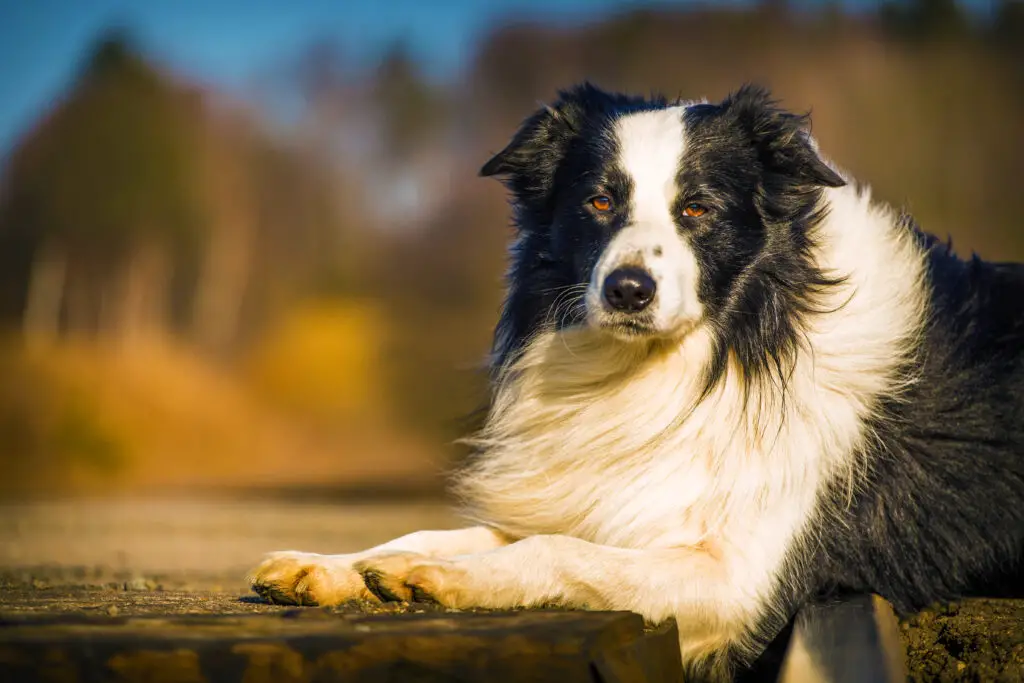
Progressive Retinal Atrophy
Progressive Retinal Atrophy (PRA), a hereditary eye disorder leading to the degeneration of the retina, can affect Border Collies.
PRA often manifests gradually, resulting in night blindness and progressive vision loss, eventually leading to complete blindness.
Responsible breeding practices that include genetic testing are crucial for minimizing the prevalence of PRA in the Border Collie population.
While there is no cure for PRA, supportive care and creating a safe and familiar environment can help affected Border Collies adapt to their changing vision.
Regular veterinary eye examinations contribute to early detection and monitoring, allowing for proactive management strategies to support the overall well-being of Border Collies with this inherited eye condition.
Hip Dysplasia and Elbow Displasia
Border Collies can be susceptible to both hip dysplasia and elbow dysplasia, two orthopedic conditions that can impact their agility and overall well-being.
Hip dysplasia involves abnormal development of the hip joint, leading to instability and potential joint issues.
Elbow dysplasia, on the other hand, is characterized by malformation and abnormal growth in the elbow joint.
These hereditary conditions can result in symptoms such as lameness, difficulty rising, and reluctance to engage in physical activities.
Responsible breeding practices, including screening breeding dogs for both hip and elbow dysplasia, are crucial for minimizing the prevalence of these conditions in the Border Collie population.
Proactive care, including weight management, regular exercise, and joint supplements, aids in managing these orthopedic issues and ensuring the overall well-being of Border Collies.
Regular veterinary check-ups are essential for early detection and effective management strategies.
Epilepsy
Epilepsy, a neurological disorder characterized by recurrent seizures, can affect Border Collies. While the exact cause of epilepsy is often unknown, genetic and hereditary factors can play a role.
Seizures in Border Collies may manifest as uncontrolled shaking, altered behavior, or loss of consciousness.
Diagnosis involves veterinary examinations and ruling out other potential causes. While there is no cure for epilepsy, antiepileptic medications can help manage and reduce the frequency of seizures.
Close collaboration with a veterinarian is essential for monitoring and adjusting the treatment plan to ensure the well-being of Border Collies with epilepsy.
Responsible breeding practices that consider the genetic factors associated with epilepsy play a crucial role in minimizing its occurrence in the breed.
Regular veterinary check-ups are important for monitoring the overall neurological health of Border Collies.
Food Allergies
Food allergies can affect Border Collies, causing various symptoms such as skin irritations, itching, digestive issues, and ear infections.
Identifying the specific allergen is crucial for effective management.
Border Collies may develop allergies to certain ingredients in their diet, including proteins, grains, or additives.
Owners can implement elimination diets, hypoallergenic food trials, or specialized veterinary-prescribed diets to identify and manage food allergies.
Consultation with a veterinarian is essential to determine the most suitable dietary plan for Border Collies with food allergies.
Regular veterinary check-ups and ongoing dietary management contribute to the overall health and well-being of these intelligent and active dogs.
To take proper care of your Border Collie’s health, make sure you:
- Schedule regular vet visits.
- Be attentive to your dog’s behavior and physical condition.
- Consider genetic testing for inherited conditions like CEA.
- Maintain a healthy diet and regular exercise routine to manage their weight, which can help reduce the strain on joints.
By staying informed about these health problems and working closely with your veterinarian, you can help ensure a long, healthy life for your Border Collie.
Grooming Your Border Collie
Proper grooming is crucial for maintaining your Border Collie’s health and appearance.
This meticulous process involves regular brushing, bathing, and additional care such as fur trimming, nail care, dental hygiene, and ear cleaning.
Brushing
Brushing your Border Collie several times a week is essential to manage their thick double coat. Use a slicker brush to remove tangles and a rake or de-shedding tool to reach the soft undercoat.
During shedding season, you may need to brush more frequently to control the excess hair.
Bathing
Bath your Border Collie every 2-3 months or as needed, using a dog-specific shampoo.
Make sure to rinse thoroughly to prevent any residue that can irritate the skin.
Remember, over-bathing can strip natural oils from their coat, which are vital for a healthy sheen.
We like this massager because it really gets the soap down through all your dog’s thick fur to their skin.
Cutting Fur/Hair
Trim your Border Collie’s fur as needed, especially around the paws and ears to prevent matting.
While a full haircut is not typically necessary for this breed, a neatening trim can keep them comfortable and tidy.
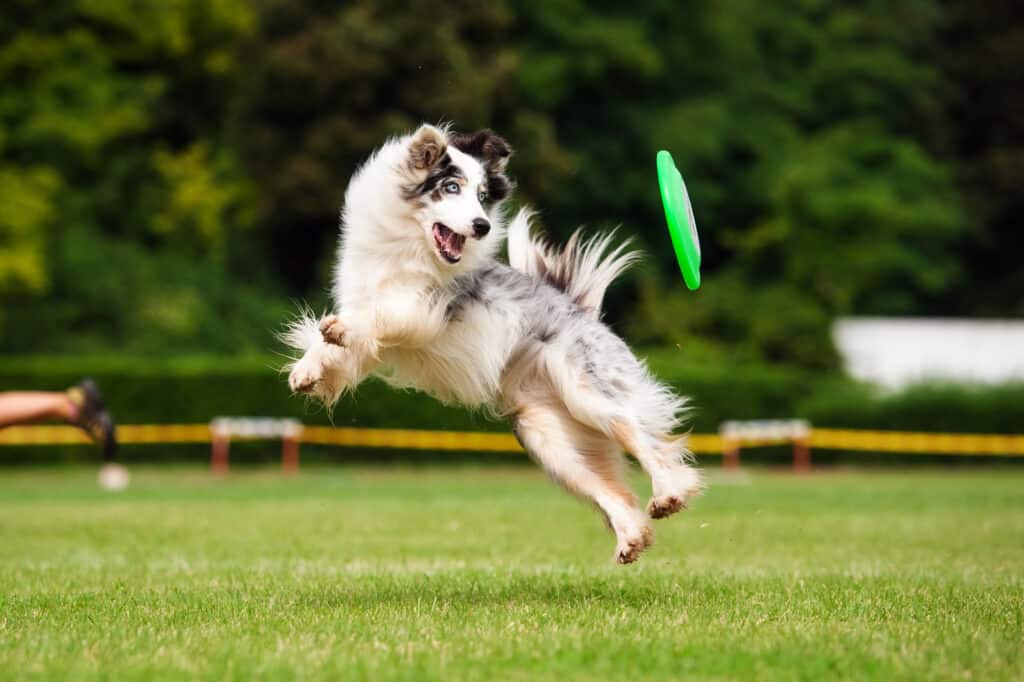
Clipping or Grinding Nails
Regularly check and maintain your Border Collie’s nails, clipping or grinding them every 4-6 weeks being careful not to cut into the quick, which can cause bleeding.
If you accidentally cut the quick, dip their nails in Styptic Powder.
Proper nail length is paramount for their comfort and to prevent issues with walking.
If you need help learning this procedure, check out our article on How to Grind Your Dog’s Nails or How to Clip Your Dog’s Nails Safely.
Dental Care
Implement a routine of brushing your dog’s teeth several times a week with canine toothpaste and toothbrush to promote dental health.
Chew toys and dental treats can also help reduce tartar buildup.
Cleaning Ears
Inspect and clean your Border Collie’s ears regularly to prevent infections, especially if they love swimming.
Use a vet-approved ear cleaner and gently wipe out any debris to keep their ears clear and healthy.
You can use the Pet MD – Dog Ear Cleaner Wipes – Otic Cleanser for Dogs for an easy fix.
Owning a Border Collie
When considering bringing a Border Collie into your life, be prepared for a high-energy, intelligent companion that requires time, dedication, and a financial commitment for both purchase and upkeep.
Cost of Purchase
The initial cost to buy a Border Collie typically ranges from $600 to $1200, depending on the breeder’s reputation and the dog’s lineage.
Certain desirable traits, such as unique colors or proven agility capabilities, can push the price higher.
Maintenance Costs
Ongoing expenses for a Border Collie include:
- Food: High-quality dog food tailored to active breeds
- Medical Costs: Routine check-ups and vaccinations; expect occasional visits related to herding breed-specific issues
- Grooming: Minimal; regular brushing suffices, but occasional professional grooming is recommended
- Special Training: Can be beneficial for managing their high energy level and intelligence
Adopting a Border Collie
Adopting a Border Collie from a shelter or rescue can be a more affordable option, averaging around $50 to $300.
This fee often covers initial medical costs and spaying/neutering.
Adoption is a responsible choice, providing a home for a dog in need and can be a rewarding experience in forming a bond with your new companion animal.
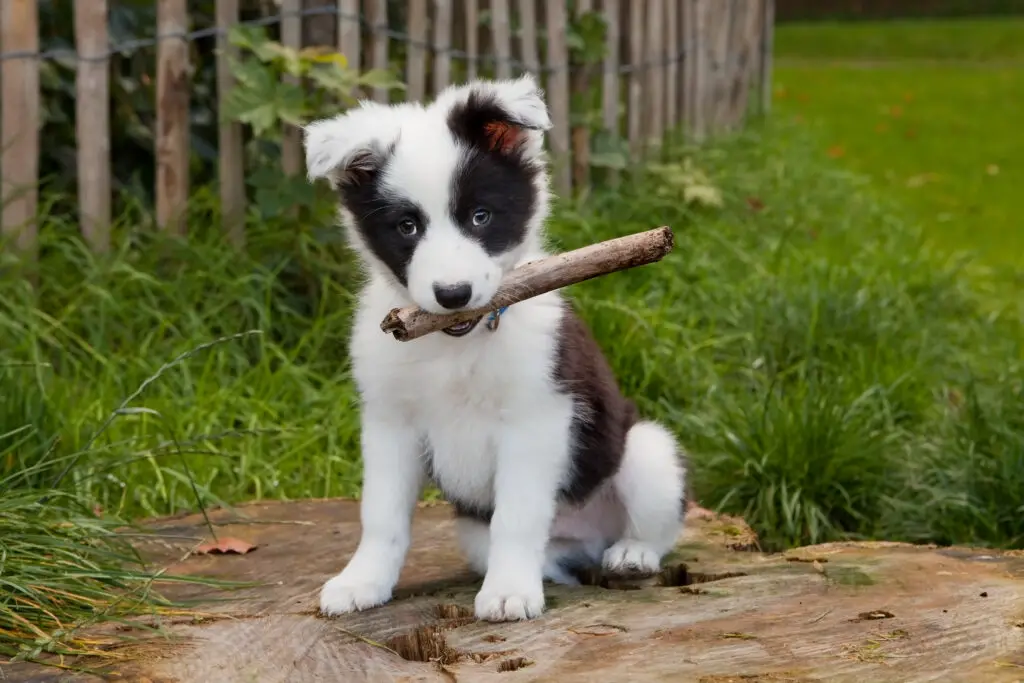
Finding Reputable Breeders
When looking to buy from reputable Border Collie breeders, ensure they are reputable by researching and verifying their credibility.
A reputable breeder should provide transparent health records and a clear return policy.
They should be interested in the dog’s welfare and your suitability as an owner, often asking detailed questions about your lifestyle and interest in the breed.
Frequently Asked Questions
In this section, you’ll find specific information addressing some of the most common queries about Border Collies, from their health to their characteristics and care requirements.
What is the typical lifespan of a Border Collie?
Border Collies are known for their longevity and can typically live between 10 to 17 years when provided with good care and regular veterinary check-ups.
What are common health issues that Border Collies may succumb to?
While they are generally healthy, Border Collies may be prone to certain conditions such as hip dysplasia, collie eye anomaly, and epilepsy.
What are the breed standard sizes for adult Border Collies?
Adult Border Collies stand at a height of 18 to 22 inches and weigh approximately 27 to 45 pounds, as defined by breed standards.
Can you describe the temperament and personality traits of Border Collies?
Border Collies possess a keen intelligence, are highly energetic, and have a strong work ethic, making them ideal for training and activities that stimulate them both physically and mentally.
How much grooming and maintenance do Border Collies require?
They have a double coat that requires regular grooming—typically a good brush a few times a week—to maintain their coat and reduce shedding.
Are Border Collies generally well-suited to living with families?
Yes, Border Collies can make great family pets, as they enjoy interacting with people and are known for their loyal and protective nature, yet they do require plenty of exercise and mental engagement.
Conclusion: Bottom Line on the Border Collie
The Border Collie stands out as one of the most intelligent dog breeds.
Your Border Collie is likely to excel in various dog sports due to their high energy level and intrinsic drive.
They are stars in activities such as tracking and obedience and often perform exceptionally well in competitive environments.
Pros:
- Highly intelligent
- Energetic, excels in dog sports
- Strong work ethic, great for farms
Cons:
- Sensitive to noise
- May engage in digging or barking if bored
- High energy level can be challenging for some owners
Understanding your Border Collie’s propensity to chase cars or exhibit unwanted behaviors like excessive barking is crucial for a harmonious living environment.
Training is key, and involvement in clubs endorsed by organizations such as the American Kennel Club can offer valuable resources and support.
It’s essential to provide ample physical and mental stimulation to satisfy their intelligent natures.
If you’re considering a Border Collie for competitive dog sports or as a companion on a farm where your dog can channel its instincts productively, this breed might be a perfect choice.
However, this breed may not be the best fit for you if your lifestyle cannot accommodate their robust requirements.
Be prepared for a commitment to training and exercise.
With the right environment and guidance, your Border Collie can not only be a loving family member but might also set records in agility and intellect.
Please read our Legal Disclaimer

